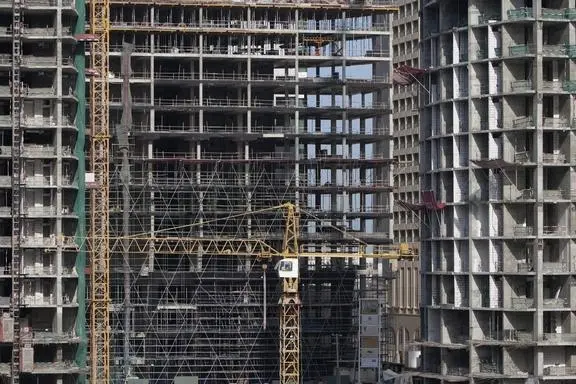PHOTO
An international coalition of built environment professional groups has jointly published for consultation the world’s first international standard for reporting carbon emissions across all areas of construction.
The Royal Institution of Chartered Surveyors (RICS), which is a member of the coalition, said in a press statement that the consultation will seek industry inputs on factoring carbon emissions directly into the decision making that goes behind planning construction projects.
The globally applicable ICMS consultation comes as the world heads toward the COP26 conference in Glasgow this November, with the overarching goals set by national governments to achieve net-zero carbon emissions in the decades to come to battle the rapidly changing climate.
The consultation will close on 10 September, the statement said, adding that the final International Cost Management (ICMS) reporting standards are expected to be published in November 2021at the COP26 conference. This would be followed by updated RICS guidance on carbon assessment – which sets out a universal methodology for calculating and assessing ‘embodied carbon.’
The statement said the new toolkit would enable decision makers to minimise the carbon footprint of construction projects.
“With construction contributing around 40 percent of the world’s carbon emissions, it’s crucial for the built environment to move towards more sustainable practices if communities are to realise their net-zero ambitions in time for 2050,’ the statement said.
Alan Muse, Head of Construction Standards at RICS and ICMS lead, added: “This update to ICMS and subsequent RICS standards which our professionals follow when completing any construction project, will see the construction sector making a large and measurable impact when it comes to leading from the front and combatting climate change.
“Supported by the latest tech, these new standards provide a professional toolkit to measure and consistently report on carbon and influence the most basic design and construction decisions.
“The new rules ask the industry to challenge themselves on every decision made – from choosing between double or triple glazing in new homes to the type of concrete used to lay track for high speed rail.
“While other aspects such as cost and safety will continue to play a key factor, of equal importance will be ensuring a greener future for the global construction sector."
The ICMS is supported by a coalition of international organisations, including:
- Africa Association of Quantity Surveyors (AAQS)
- Association for the Advancement of Cost Engineering International (AACE)
- Association of Cost Engineers (ACostE)
- Association of South African Quantity Surveyors (ASAQS)
- Australian Institute of Quantity Surveyors (AIQS)
- Brazilian Institute of Cost Engineers (IBEC)
- Building Surveyors Institute of Japan (BSIJ)
- Canadian Association of Consulting Quantity Surveyors (CACQS)
- Canadian Institute of Quantity Surveyors (CIQS)
- Chartered Institute of Building (CIOB)
- Chartered Institution of Civil Engineering Surveyors (CICES)
- China Electricity Council (CEC)
- China Engineering Cost Association (CECA)
- Commonwealth Association of Surveying and Land Economy (CASLE)
- Conseil Européen des Economistes de la Construction (CEEC)
- Consejo General de la Arquitectura Técnica de España (CGATE)
- Dutch Association of Quantity Surveyors (NVBK)
- European Federation of Engineering Consultancy Associations (EFCA)
- Fédération Internationale des Géomètres (FIG)
- Fiji Institute of Quantity Surveyors (FIQS)
- Ghana Institution of Surveyors (GhIS)
- Hong Kong Institute of Surveyors (HKIS)
- Ikatan Quantity Surveyor Indonesia (IQSI)
- Indian Institute of Quantity Surveyors (IIQS)
- Institute of Engineering and Technology (IET)
- Institute of Quantity Surveyors of Kenya (IQSK)
- Institute of Quantity Surveyors Sri Lanka (IQSSL)
- Institution of Civil Engineers (ICE)
- Institution of Surveyors of Kenya (ISK)
- Institution of Surveyors of Uganda (ISU)
- International Cost Engineering Council (ICEC)
- Italian Association for Total Cost Management (AICE)
- Korean Institution of Quantity Surveyors (KIQS)
- Fachverein für Management und Ökonomie im Bauwesen (maneco)
- New Zealand Institute of Quantity Surveyors (NZIQS)
- Nigerian Institute of Quantity Surveyors (NIQS)
- Pacific Association of Quantity Surveyors (PAQS)
- Philippine Institute of Certified Quantity Surveyors (PICQS)
- Property Institute of New Zealand (PINZ)
- Quantity Surveyors International (QSi)
- Real Estate Institute of Botswana (REIB)
- Royal Institute of British Architects (RIBA)
- Royal Institution of Chartered Surveyors (RICS)
- Royal Institution of Surveyors Malaysia (RISM)
- Singapore Institute of Building Limited (SIBL)
- Singapore Institute of Surveyors and Valuers (SISV)
- Sociedad Mexicana de Ingeniería Económica, Financiera y de Costos (SMIEFC)
- Society of Chartered Surveyors Ireland (SCSI)
- Union Nationale des Economistes de la Construction (UNTEC)
(Writing by SA Kader; Editing by Anoop Menon)
Disclaimer: This article is provided for informational purposes only. The content does not provide tax, legal or investment advice or opinion regarding the suitability, value or profitability of any particular security, portfolio or investment strategy. Read our full disclaimer policy here.
© ZAWYA 2021




















